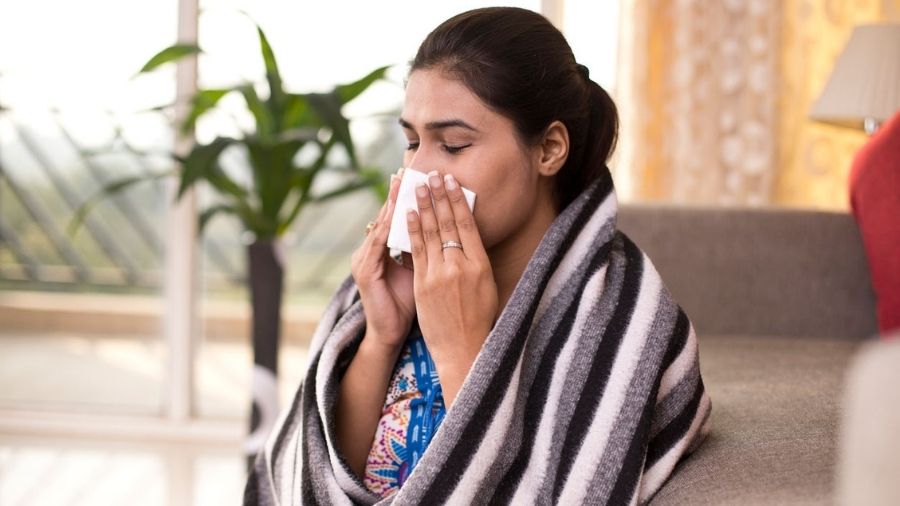Health
Preventing Common Cold and Flu
 The common cold and flu are viral respiratory illnesses that affect millions of people worldwide each year. These illnesses can cause discomfort, fatigue, and missed days of work or school. However, there are steps you can take to reduce your risk of catching a cold or the flu. In this article, we will explore various preventive measures that can help you stay healthy and avoid these common illnesses.
The common cold and flu are viral respiratory illnesses that affect millions of people worldwide each year. These illnesses can cause discomfort, fatigue, and missed days of work or school. However, there are steps you can take to reduce your risk of catching a cold or the flu. In this article, we will explore various preventive measures that can help you stay healthy and avoid these common illnesses.
Preventing Common Cold and Flu
The common cold and flu are prevalent respiratory infections that can make you feel miserable. However, by taking proactive measures, you can significantly reduce your risk of catching these illnesses and improve your overall well-being.
Understanding the common cold and flu
Before we delve into preventive strategies, let’s first understand what the common cold and flu are. The common cold is a viral infection that primarily affects the nose and throat. It is characterized by symptoms such as a runny or stuffy nose, sneezing, sore throat, and cough. On the other hand, the flu, also known as influenza, is a more severe illness that can cause high fever, body aches, fatigue, and respiratory symptoms.
Both the common cold and flu are primarily transmitted through respiratory droplets from infected individuals. When someone with a cold or flu coughs or sneezes, tiny droplets containing the virus can land on surfaces or be inhaled by others, leading to infection.
Building a strong immune system

A robust immune system plays a vital role in preventing the common cold and flu. To strengthen your immune system, focus on the following factors:
Eating a balanced diet: Consuming a variety of fruits, vegetables, whole grains, lean proteins, and healthy fats provides essential nutrients that support immune function.
Getting regular exercise: Engaging in moderate exercise regularly can enhance immune response and reduce the risk of respiratory infections.
Prioritizing sleep: A good night’s sleep is crucial for immune health. Aim for 7-9 hours of quality sleep each night.
Managing stress levels: Chronic stress can weaken the immune system. Practice stress management techniques like meditation, deep breathing, or engaging in hobbies to reduce stress.
Practicing good hygiene
 Maintaining proper hygiene is an effective way to prevent the spread of cold and flu viruses. Follow these hygiene practices:
Maintaining proper hygiene is an effective way to prevent the spread of cold and flu viruses. Follow these hygiene practices:
Washing hands frequently: Thoroughly wash your hands with soap and water for at least 20 seconds, especially before eating, after using the restroom, and after being in public places.
Avoiding touching your face: Viruses can enter your body through your eyes, nose, or mouth. Minimize touching your face to reduce the risk of infection.
Covering your mouth and nose: Use a tissue or your elbow to cover your mouth and nose when coughing or sneezing to prevent respiratory droplets from spreading.
Cleaning and disinfecting: Regularly clean and disinfect frequently-touched surfaces such as doorknobs, light switches, and mobile devices.
Getting vaccinated
Vaccination is a crucial preventive measure against the flu. Annual flu vaccines can significantly reduce the risk of flu-related complications and hospitalizations. It is recommended to get vaccinated before the flu season begins, ideally in the early fall. Consult your healthcare provider to determine the appropriate vaccination schedule for you.
Avoiding close contact with sick individuals
When someone around you is sick with a cold or flu, minimizing close contact can help prevent the spread of the viruses. Avoid shaking hands, hugging, or spending extended periods in close proximity to individuals who are ill.
Strengthening your respiratory system
 Maintaining a healthy respiratory system can aid in preventing respiratory infections. Consider the following measures:
Maintaining a healthy respiratory system can aid in preventing respiratory infections. Consider the following measures:
Quitting smoking: Smoking weakens the immune system and damages the respiratory system, making you more susceptible to infections.
Limiting exposure to air pollutants: Avoid or minimize exposure to pollutants such as secondhand smoke, air pollution, and chemical irritants.
Using a humidifier: Maintaining proper humidity levels in your home can help keep your respiratory system moist and less prone to irritation.
Supplementing with vitamins and minerals
Certain vitamins and minerals can support immune function and help protect against cold and flu viruses. Consider the following supplements:
Vitamin C and zinc: These nutrients are known to enhance immune response. Include foods rich in vitamin C (such as citrus fruits, berries, and leafy greens) and zinc (found in seafood, legumes, and nuts) in your diet or take supplements if needed.
Other beneficial supplements: Probiotics, elderberry extract, and echinacea are among the supplements that may help boost your immune system.
Balancing indoor environment
 Creating a healthy indoor environment is essential for preventing respiratory infections. Pay attention to the following factors:
Creating a healthy indoor environment is essential for preventing respiratory infections. Pay attention to the following factors:
Improving indoor air quality: Regularly ventilate your home to reduce the concentration of airborne pollutants and ensure fresh air circulation.
Maintaining optimal humidity levels: Aim for a humidity level between 40% and 60% to prevent the proliferation of viruses and maintain respiratory health.
Managing lifestyle factors
Certain lifestyle choices can influence your susceptibility to cold and flu viruses. Consider the following:
Limiting alcohol consumption: Excessive alcohol intake can weaken the immune system. Drink alcohol in moderation or avoid it altogether.
Avoiding excessive caffeine intake: High caffeine consumption can disrupt your sleep patterns, affecting immune function. Limit your intake and opt for healthier alternatives.
Incorporating relaxation techniques: Chronic stress can compromise your immune system. Practice relaxation techniques like yoga, meditation, or deep breathing to reduce stress levels.
Traveling precautions

When traveling, it’s essential to take extra precautions to protect yourself from potential exposure to viruses. Follow these guidelines:
Taking necessary precautions during travel: Wash your hands frequently, avoid touching your face, wear a mask when necessary, and maintain social distancing in crowded areas.
Boosting your immune system before traveling: Ensure you are well-rested, maintain a healthy diet, and consider taking immune-supporting supplements before your trip.
Conclusion
Preventing the common cold and flu is possible by adopting various preventive measures. Building a strong immune system, practicing good hygiene, getting vaccinated, avoiding close contact with sick individuals, and taking care of your respiratory system are effective ways to reduce your risk of getting sick. Additionally, balancing your indoor environment, managing lifestyle factors, and taking precautions while traveling can further enhance your protection against these viral infections.
FAQs
1. Can antibiotics treat the common cold or flu?
Antibiotics are ineffective against viral infections like the common cold and flu since they only target bacteria. These illnesses are caused by viruses, so antibiotics should not be used unless there is a bacterial complication.
2. How long does it take to recover from a cold or flu?
The duration of recovery can vary depending on several factors, including individual health, age, and the specific virus causing the illness. Generally, cold symptoms may last for a week or two, while flu symptoms can persist for a few days to a couple of weeks.
3. Are there any natural remedies to prevent cold and flu?
While natural remedies cannot guarantee complete prevention, certain practices may support your immune system and reduce the risk of catching a cold or flu. These include maintaining a healthy lifestyle, getting adequate sleep, and consuming a balanced diet rich in immune-boosting nutrients.
4. Is it safe to exercise when you have a cold or flu?
It is generally recommended to avoid intense exercise when you have a cold or flu as it can strain your body and potentially worsen your symptoms. However, light to moderate exercise, such as a gentle walk, can help alleviate congestion and boost your mood.
5. What are the main differences between a cold and the flu?
While both the common cold and flu are respiratory illnesses, they are caused by different viruses and have distinct symptom profiles. Colds are usually milder and primarily affect the nose and throat, whereas the flu is often more severe and can cause additional symptoms such as fever, body aches, and fatigue.
-

 Money2 weeks ago
Money2 weeks agoOld vs New Tax Regime: Key Differences & Which One to Choose in 2025
-

 Money4 weeks ago
Money4 weeks agoHow Much Money Do You Need to Retire Early in India? A Comprehensive Guide
-

 Education3 weeks ago
Education3 weeks agoTop 5 Scholarships Available for Indian Students in 2025
-

 Money4 weeks ago
Money4 weeks ago7 Key Benefits of Hiring a Financial Advisor-Even If You’re Financially Secure
-

 Health4 weeks ago
Health4 weeks ago5 Mistakes You Might Be Making While Eating Dry Fruits (and How to Fix Them)
-

 Money3 weeks ago
Money3 weeks agoHow to Get a Low-Interest Home Loan: Insider Tips & Tricks
-

 Money4 weeks ago
Money4 weeks agoMoney After Divorce: How Courts Calculate Alimony
-

 How to3 weeks ago
How to3 weeks agoHow to Create Studio Ghibli-Inspired Images for Free Without ChatGPT













